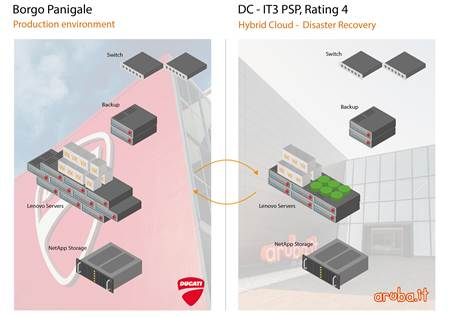Ducati Motor Holding benefits from a state-of-the-art IT infrastructure which at the beginning of last year had launched a fully customized project aimed at enhancing the performance of its IT architecture, as well as increase the resilience of the services it provides. One of the main objectives was to renew its existing technological approach by tapping into the cloud and creating a hybrid approach. To do this, it made use of the collaboration and knowledge of the two most innovative and leading IT companies within their respective sectors: Aruba Enterprise and Lenovo.
Aruba Enterprise proposed a project that encompassed completely different hardware and configuration settings to Ducati’s previous infrastructure. The approach has totally transformed its traditional architectures and logics to enable a new data center concept. Aruba assisted in renewing Ducati's on-premise data center hardware in the form of a service in Private Cloud mode. This allowed for entirely dedicated cloud solution to guarantee the highest level of security, as well as a disaster recovery environment within the Aruba Global Cloud Data Center for the company’s critical applications in Borgo Panigale.
At the same time, Lenovo worked with Ducati to design and implement the upgrade of its HPC cluster, based on Lenovo ThinkSystem SD530, SR630 and SR650 servers. It is equipped with the latest generation Intel® Xeon® scalable processors and NVIDIA Tesla M10 GPUs, V100 and connected with Lenovo’s ThinkSystem NE1032 RackSwitch Low Latency Switch. In parallel to the HPC project, Ducati also used Lenovo technology in the configuration of its two new data centers: one at the Borgo Panigale (Bologna) and the other at the Disaster Recovery (DR) site in Ponte San Pietro (Bergamo). Together, both data centers contain 20 ThinkSystem SR630 servers and 4 ThinkSystem SR550 servers, configured as Active / Active clusters with Production and Development / Test workloads distributed across the two sites. This configuration allows Ducati to apply failover procedures in the event of a disaster with minimum downtime. The implementation can be activated at a later stage in the Business Continuity project, as well as being GDPR compliant by design and providing protection for mission critical apps.
The choice proved to be a successful one, especially given the recent period of uncertainty surrounding Covid-19. The design of the infrastructure has allowed Ducati to "transform" from a desk-centric company into a mobile-first company in a few days, while maintaining efficient operations and performance. One of the main advantages of the new solution is having a customized infrastructure ready for extension and up-scaling. Ducati now has complete freedom to use all computational resources dedicated to disaster recovery to test and develop environments, as if they were primary resources. This way, the company has access to more computing power and can take advantage of the test machines for new products, while improving the time required to market its business.
Similarly, Ducati has been able to migrate workloads from its main headquarters to peripheral sites, the disaster recovery site, using this as an active site and not exclusively for data recovery. Through this approach, part of the cold data used by the computing cluster no longer resides on the central site, allowing Ducati to manage a large part of data in memory, speed up computation times and distribute workloads between the various nodes. Since the project’s inception in 2018, four new 2D VDI nodes have been added at the Aruba Global Cloud Data Center to manage office automation applications. This now makes it possible to move workloads from Ducati’s HQ in Bologna to the remote site, while continuing to guarantee access to services even in remote working mode.
“Using the latest and most advanced technologies is part of Ducati's DNA," said Konstantin Kostenarov, Chief Technology Officer at Ducati. “Relying on the best technologies made available through our partners has significantly contributed to the overall improvement of processes, while at the same time increasing the value of the results achieved. The choices made two years ago and the projects that have been carried out since then have allowed us to tackle the various complexities of this sport in the most effective way possible.”
“Among the technologies that have emerged as a result of Covid-19, the cloud is undoubtedly one that has proven its worth and made it possible to better face crisis situations. An internal commissioned survey reveals that 59% of those who were able to use cloud solutions during emergency situations considered its use to be fundamental to their operations,” said Giorgio Girelli, General Manager of Aruba Enterprise.“ The sharing and combination of the latest technologies between the three companies involved has given life to a very innovative project focused on one goal: obtaining maximum performance.”
"The recent covid-19 crisis that we are still experiencing globally has forced companies to implement and strengthen their remote working practices” said Alessandro de Bartolo, Lenovo Data Center Group's Country General Manager for Italy. “Our collaboration with Ducati is making full use of our latest Lenovo ThinkSystem technologies that supports business continuity and promotes remote working. We are particularly pleased with the effective and synergistic collaboration that has been established between everyone involved in the project" concluded Alessandro de Bartolo.




